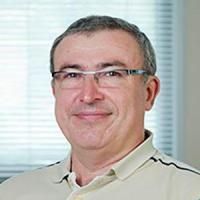Modeling hematopoietic system response caused by chronic exposure to ionizing radiation.
Date
2011-05
Journal Title
Journal ISSN
Volume Title
Repository Usage Stats
views
downloads
Citation Stats
Abstract
A new model of the hematopoietic system response in humans chronically exposed to ionizing radiation describes the dynamics of the hematopoietic stem cell compartment as well as the dynamics of each of the four blood cell types (lymphocytes, neutrophiles, erythrocytes, and platelets). The required model parameters were estimated based on available results of human and experimental animal studies. They include the steady-state number of hematopoietic stem cells and peripheral blood cell lines in an unexposed organism, amplification parameters for each blood line, parameters describing proliferation and apoptosis, parameters of feedback functions regulating the steady-state numbers, and characteristics of radiosensitivity related to cell death and non-lethal cell damage. The model predictions were tested using data on hematological measurements (e.g., blood counts) performed in 1950-1956 in the Techa River residents chronically exposed to ionizing radiation since 1949. The suggested model of hematopoiesis is capable of describing experimental findings in the Techa River Cohort, including: (1) slopes of the dose-effect curves reflecting the inhibition of hematopoiesis due to chronic ionizing radiation, (2) delay in effect of chronic exposure and accumulated character of the effect, and (3) dose-rate patterns for different cytopenic states (e.g., leukopenia, thrombocytopenia).
Type
Department
Description
Provenance
Subjects
Citation
Permalink
Published Version (Please cite this version)
Publication Info
Akushevich, Igor V, Galina A Veremeyeva, Georgy P Dimov, Svetlana V Ukraintseva, Konstantin G Arbeev, Alexander V Akleyev and Anatoly I Yashin (2011). Modeling hematopoietic system response caused by chronic exposure to ionizing radiation. Radiat Environ Biophys, 50(2). pp. 299–311. 10.1007/s00411-011-0351-3 Retrieved from https://hdl.handle.net/10161/14854.
This is constructed from limited available data and may be imprecise. To cite this article, please review & use the official citation provided by the journal.
Collections
Scholars@Duke

Igor Akushevich

Svetlana Ukraintseva
Dr. Ukraintseva studies causes of human aging and related decline in resilience, to identify genetic and other factors responsible for the increase in mortality risk with age eventually limiting longevity. She explores complex relationships, including trade-offs, between physiological aging-changes and risks of major diseases (with emphasis on Alzheimer’s and cancer), as well as survival, to find new genetic and other targets for anti-aging interventions and disease prevention. She also investigates possibilities of repurposing of existing vaccines and treatments for AD prevention and interventions into the aging. For this, Dr. Ukraintseva and her team use data from several large human studies containing rich genetic and phenotypic information (including longitudinal measurements) on thousands of individuals. Dr. Ukraintseva is a PI and Key Investigator on several NIH funded grants, and has more than 130 peer-reviewed publications, including in major journals such as Nature Reviews, Stroke, European Journal of Human Genetics, and some other.

Konstantin Arbeev
Konstantin G. Arbeev received the M.S. degree in Applied Mathematics from Moscow State University (branch in Ulyanovsk, Russia) in 1995 and the Ph.D. degree in Mathematics and Physics (specialization in Theoretical Foundations of Mathematical Modeling, Numerical Methods and Programming) from Ulyanovsk State University (Russia) in 1999. He was a post-doctoral fellow in Max Planck Institute for Demographic Research in Rostock (Germany) before moving to Duke University in 2004 to work as a Research Scientist and a Senior Research Scientist in the Department of Sociology and the Social Science Research Institute (SSRI). He is currently an Associate Research Professor in SSRI. Dr. Arbeev's major research interests are related to three interconnected fields of biodemography, biostatistics and genetic epidemiology as pertains to research on aging. The focus of his research is on discovering genetic and non-genetic factors that can affect the process of aging and determine longevity and healthy lifespan. He is interested in both methodological advances in this research area as well as their practical applications to analyses of large-scale longitudinal studies with phenotypic, genetic and, recently, genomic information. Dr. Arbeev authored and co-authored more than 150 peer-reviewed publications in these areas.

Anatoli I. Yashin
Unless otherwise indicated, scholarly articles published by Duke faculty members are made available here with a CC-BY-NC (Creative Commons Attribution Non-Commercial) license, as enabled by the Duke Open Access Policy. If you wish to use the materials in ways not already permitted under CC-BY-NC, please consult the copyright owner. Other materials are made available here through the author’s grant of a non-exclusive license to make their work openly accessible.
